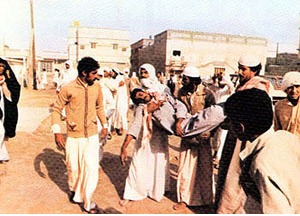- About
- Topics
- Picks
- Audio
- Story
- In-Depth
- Opinion
- News
- Donate
- Signup for our newsletterOur Editors' Best Picks.Send
Read, Debate: Engage.
The public flogging of Raif Badawi, the Saudi Arabian rights activist and blogger, is delayed for a second time due to Badawi's poor health.
Badawi, who is also the co-founder of the now-banned Free Saudi Liberals website, was already arrested and sentenced in 2012, then re-sentenced to 1000 lashes and ten years in prison plus a fine in 2014. The lashes are being carried out over 20 weeks. The first 50 were administered on January 9, 2015.
The reaction of the Western population is protest against the violation of human rights - that of their governments restraint. No wonder, some may say: Saudi Arabia is one of the largest oil producer, major trading partner, and the West needs the Kingdom in the fight against Islamist terrorists. Is that really the reason why the governments of democratic countries find it difficult to agree on tougher reactions against Saudi Arabia? It seems like sanctions against violations of human rights became a cost-benefit analysis.
According to the study „Not all dictators are equal“ published recently by the Journal of Peace Research, the governments of democratic states seem to have double standards when it comes to countries that violate human rights.
The researchers Christian von Soest (GIGA German Institute of Global and Area Studies & Weatherhead Center for International Affairs, Harvard University) and Michael Wahman (Department of Government, London School of Economics and Political Science) were able to demonstrate that the closer the economic relations of a country with the West and the more a country runs a pro-Western foreign policy, the less authoritarian regimes need to fear sanctions. The analysis is carried out using a new dataset of US and EU sanctionsagainst authoritarian states in the period 1990–2010. This represents more than half of all penalties during this period.
"We argue that Western leaders weight domestic and international pressure to impose sanctions against the probability of sanction success and the sender’s own political and economic costs", is one of the researcher's statement.
